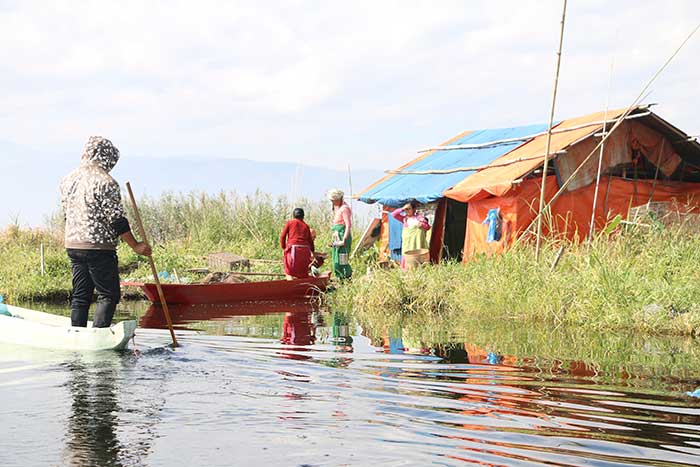
Since 1990, Manipur decided to celebrate Loktak Day under the motto of ‘Save Loktak Lake’. Loktak Lake which is one of the primary tourist attractions is consistently turning into a political discourse. It has become not only a dialogue of climate change, development, livelihood, tourism, but also of identity and struggle. This dialogue exploded into a singular event on November 2011. Ever since, Loktak has become a delicate discourse, a political one. The episode of invading into littoral’s households and burning of the same has brought out the discourse of power control over Loktak. Linton (2010) has rightly addressed how water has become modern, in recent times water began to hold power insistently. It has become a tool of aggravating supremacy.
During the dialogue of saving Loktak Lake, an important aspect of the Lake-ecosystem has been losing their life-world. While emphasizing the urgency of maneuvering Loktak, state has negotiated the identity of an indigenous community. Littorals of the lake that has been displaced since 2011 are in a state of distress. Displacement has created alienation from their identity. They are a community who are known as ‘paat-ki-mi’ (people of the lake) are feeling suppressed, as they are not able to practice their cultural and traditional practices that are dominated with water perspectives. Their everyday ritual begins with seeking for a fruitful day from Loktak Lairembee (goddess of Loktak) and ends by thanking for keeping them safe in water. Till dawn to dusk they interact with lake and the ecosystem. Their collective memory is rich with water narratives. They have developed an understanding of the Lake-ecosystem with repetitive physical and emotional interaction with the lake. When there is an intimacy between nature and people, a traceable bond develops. People began to understand the rhythm and patterns of nature (Strang, 2008). Likewise, littorals of Loktak no longer consider themselves different from the Lake-ecosystem. They identify themselves as part of the lake, and acknowledge their community as ‘water-people’.
Livelihood and settlement of the littorals has been under question since 1993, when Loktak was listed in Montreux Record of vulnerable ecosystem. They have been cited as the reason for polluting the lake due to their engagement with the lake. But again there are many other valid reasons behind the pollution of Loktak. Such as, the cities have been dumping non-degradable materials in the rivers which end on the lake. And since 1980, Ithai Barrage has changed the entire ecosystem of Loktak. Littorals have correctly specified how the state has not taken into consideration of these aspects and have been blaming their engagements with the lake. They are addressing the fact of why they have to take all the blame for polluting the lake, when they take Loktak as their mother unlike the state. Their relationship with Loktak is widely known as mother-children relationship. Since the episodic event of 2011, they were wary about the distance between them and Loktak, which resulted in the existence of a temple of Loktak Lairembee (Goddess of Loktak) in 2012. As their interaction were prohibited by Loktak Development Authority (LDA), they did not have much option left but to find solace on land. Since 2012, littorals began to celebrate her annually. The festival is a further construction of their relationship with Loktak. It is a display of their identity as ‘paat-ki-mi’.
Their resistance cannot be understood specifically only on advantage of livelihood, but it also gives us the whole discourse of passion about a space one would have. It demonstrates a further discourse of meaning making of a space. The ongoing resistance makes us think of why a community would want to live on a fluid space, which has more negative aspects from being a ‘land-people’. They consider themselves different from the people on land in terms of their life-world; they take land as a space where they can conduct their business. Whereas, Loktak is where their ancestors have lived and where they belong. It also reflect the trail along which life is lived (Ingold, 2011). However, one may not deny that this and many more valid enquiry can be answerable by their simple act of addressing Loktak as their mother. So, why can we not look into the pollution of Loktak, but also alienation of the community as well? How do we understand the degradation of the lake, but also the dilemma of displacement of the community? What are the measures, we as an individual can take to preserve Loktak and also the littorals?
One might ask the state, when Loktak Day was enunciated under the positive motto of saving Loktak; did the state include the littorals? How would one understand Loktak without considering the littorals or otherwise? On this Environment Day, can we, as environment conscious people, rethink of why Loktak and ‘paat-ki-mi’ are interchangeable? Or can we actually understand the ecological perspectives of Loktak without the life-world of littorals or vice-versa?
‘We have never been fearful of losing our identity and degradation of our cultural practices since 2011. We feel alienated on land – a displaced littoral’
*Manimala is an independent researcher who works on Northeast. She is also a part of the Pangsau Collective. This work on Loktak is made possible and is a part of the fellowship she received from Firebird Fellowship for the Documentation of Oral Literature and Traditional Ecological Knowledge to work on the project title Littoral Community in Loktak Lake: precarity and everyday life.










































